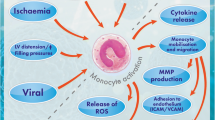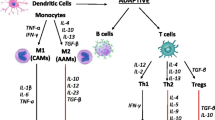Abstract.
Immune activation plays a significant role in the development and progression of chronic heart failure (CHF). Indeed, pro-inflammatory cytokines, especially tumour necrosis factor-α (TNFα) are activated in this condition and exert direct detrimental actions on the myocardium. Physiological dampeners of TNFα production, such as interleukin-10, catecholamines, cortisol, and others fail in the course of the disease. However, the outcomes of two large-scale clinical trials with etanercept and infliximab, which directly antagonise TNFα have been rather disappointing. Nevertheless, TNFα antagonism remains a major target of CHF therapy, although counterbalancing this cytokine alone may not be sufficient.
Similar content being viewed by others
Author information
Authors and Affiliations
Corresponding author
Rights and permissions
About this article
Cite this article
von Haehling, S., Jankowska, E.A. & Anker, S.D. Tumour necrosis factor-α and the failing heart. Basic Res Cardiol 99, 18–28 (2004). https://doi.org/10.1007/s00395-003-0433-8
Received:
Revised:
Accepted:
Published:
Issue Date:
DOI: https://doi.org/10.1007/s00395-003-0433-8




